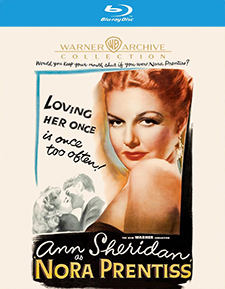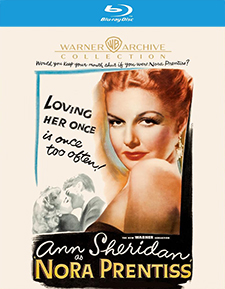Nora Prentiss (Blu-ray Review)

Director
Vincent ShermanRelease Date(s)
1947 (December 17, 2024)Studio(s)
Warner Bros. (Warner Archive Collection)- Film/Program Grade: B
- Video Grade: A
- Audio Grade: A
- Extras Grade: C+
Review
In film noir, certain elements appear again and again. One of the most prevalent is the femme fatale, a woman whose allure, influence, ambitions, and persistence lead a man to commit a crime or crimes. In Nora Prentiss, this is abandoned in favor of very different type of female character.
Richard Talbot (Kent Smith, Cat People) is a respectable San Francisco doctor with a wife, Lucy (Rosemary DeCamp, Yankee Doodle Dandy) and two teenaged children. One night, as he’s leaving work, there’s an accident. A woman has been hit by a truck. Dr. Talbot rushes to assist, sees that her injuries are minor, and has her brought to his office for treatment. The woman is nightclub singer Nora Prentiss (Ann Sheridan, Kings Row). She’s flirtatious with the stuffy physician, who retains his professional manner but clearly taken with her beauty and charm.
When Lucy and the children go out of town for a few days, Dr. Talbot goes to the club where Nora works. He seems transfixed by her and their relationship develops. Even after his family returns he spends more and more time with her, coming home late on the pretext of working. Nora has reawakened a long-dormant passion and transformed the doctor from a staid, conservative family man to an infatuated, obsessive romantic.
When a desperately ill man with no family dies of a massive heart attack in his office, Talbot uses his patient’s death to feign his own death in a staged “accident.” He believes this is his opportunity to be with Nora, and he’s willing to sacrifice the life he’s known. Nora, believing Talbot is in the process of asking Lucy for a divorce, is unaware of his subterfuge.
Interestingly, it’s Talbot rather than Nora who instigates a plan that ultimately draws both of them into a life of lies and desperation. The doctor’s scheme seems oddly elaborate for a sedate family man, but in film noir passion, not reason, rules.
As Talbot, Smith is stiff and wooden. This is fine when he plays the restrained, shy doctor, but his performance fails to evolve as his character transforms into an ardent and eventually desperate lover. He never loosens up even when he's in romantic scenes with Sheridan. When, sequestered for months in a hotel to avoid being recognized, his character must show the effects of cabin fever, Smith seems barely perturbed.
Sheridan does a better job as Nora, a smalltime nightclub entertainer who’s not had much luck in love and sees in Talbot a thoughtful, caring gentleman. Her growing affection for Talbot is believable because it’s tinged with wariness and Sheridan succeeds in projecting both emotions.
Rosemary DeCamp, made up to look older and dowdier, plays Lucy convincingly as the controlling wife and mother who holds her family and herself to exacting standards and outwardly remains rigidly composed despite suspecting that her husband’s long nights away from home involve more than work. Robert Alda (Rhapsody in Blue) plays suave nightclub owner Phil Dinardo, a longtime friend of Nora’s who clearly is carrying a torch for her. Bruce Bennett (The Treasure of the Sierra Madre) portrays Talbot’s partner, Dr. Joel Merriman, a fast-living bachelor who appears to lack self-discipline but turns out to be more grounded than Talbot as he tries to make sense of the abrupt changes in his partner’s lifestyle.
The screenplay by N. Richard Nash tends to extend scenes longer than necessary and has Talbot make highly unlikely decisions. The film is involving despite these weaknesses, but a more skillful leading man would have made it considerably more believable.
Nora is not actually a noir-style femme fatale. Rather than enticing Talbot to do wrong for her benefit, she tries to discourage him. She's the catalyst, not the driving force, to his actions. He lies to her, gives her false expectations, and draws her into a dismal life hardly of her own creation. This makes her a sympathetic character, not an evil interloper and instigator.
Nora Prentiss was shot by director of photography James Wong Howe on 35 mm black & white film with spherical lenses, finished photochemically, and presented in the Academy aspect ratio of 1.37:1. The Blu-ray is a new HD master struck from a 4K scan of the original nitrate camera negative. Contrast and clarity are superior. Blacks are deep and velvety, especially effective in night scenes with specks of illumination from street lights, neon signs, and car headlights. Howe creates atmospheric, stylized shadows typical of noir, and there are some nice location scenes set at night in both San Francisco and New York. A final scene, shot from a high angle, features two figures walking away from the camera on a foggy street.
Details such as Sheridan’s flowing hair, Smith’s facial stubble, patterns in clothing, Sheridan’s curious hats, and table settings in a restaurant scene are well delineated.
The soundtrack is English 2.0 DTS-HD Master Audio. English SDH subtitles are an available option. Dialogue is clear and distinct. Smith delivers his dialogue in a clipped monotone when he’s still the routine-driven Dr. Talbot. His delivery becomes only slightly more natural as Talbot’s relationship with Nora deepens. Sheridan sings two songs, Would You Like a Souvenir? and Who Cares What People Say? backed by a nightclub’s full orchestra. Franz Waxman’s score contains hints of menace and suspenseful chords that foreshadow the couple’s difficulties.
Bonus materials on the Blu-ray release from the Warner Archive Collection include the following:
- The Big Snooze (7:23)
- So You Think You’re a Nervous Wreck (10:59)
- Original Theatrical Trailer (2:37)
The Big Snooze – Inspired by the book and film The Big Sleep, this 1946 Warner Bros. Looney Tunes cartoon finds Bugs Bunny and Elmer Fudd in the midst of a chase. Convinced that the writers will never allow him to catch Bugs, Elmer rips up his Warners contract and goes fishing, but Bugs is persistent. The rabbit finds Elmer asleep and manages to work his way into his dreams, where more chaos ensues. The Technicolor film, directed by Robert Clampett and Arthur Davis, features the voice talents of Mel Blanc and Arthur Q. Bryan.
So You Think You’re a Nervous Wreck – An off-screen narrator describes a stressful day in the life of Joe McDoakes. He’s shown at a club luncheon, at work, and in a doctor’s office. In each instance, he’s frustrated, tense, and unable to stand up for himself. The doctor hooks him up to a machine that reads his thoughts and we see McDoakes as a brave cowboy in a saloon striking fear into men at the bar. Now confident, McDoakes leaves the doctor’s office, returns to work, asserting himself in rough, rude ways, and finally winds up in jail, smiling and content.
Nora Prentiss was pretty strong for the time, since it’s clear that Talbot and Nora are not only having an affair, they're living together, unwed. The same story shown on television today would seem tame. Ann Sheridan has a strong role as Nora and makes her sympathetic, since it’s Talbot’s infatuation that draws her into a life she never counted on. Kent Smith does his best as the obsessed Dr. Talbot but never quite convinces that he would risk so much on his infatuation. The script suffers from the improbability of Talbot’s staging an “accident” that's the kind of thing gangsters, not subdued, doctors would think of.
- Dennis Seuling

